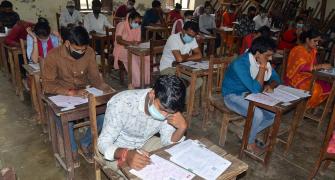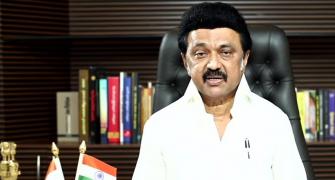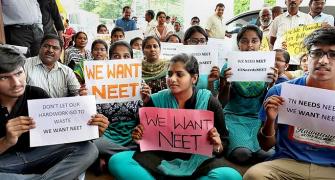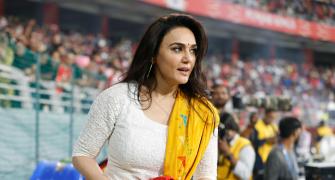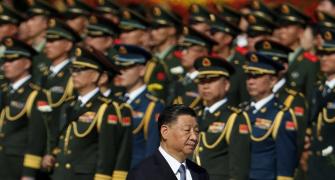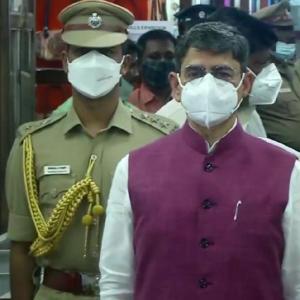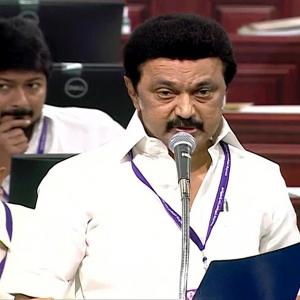The ruling DMK in Tamil Nadu had begun seeing Governor Ravi's decisions and actions as a part of the state BJP's non-stop criticism of its government and directed from Delhi, a view strengthened by the governor's decision to return the NEET exemption bill, points out N Sathiya Moorthy.

After 'suffering in silence' for eight months, Tamil Nadu Chief Minister M K Stalin has declared war on Governor Ravindra Narayana Ravi, or so it seems.
An 'all-party' decision to reconvene the state assembly on February 8 to pass the NEET exemption bill a second time after the governor had returned it after long gestation is a Constitutional process, but it is also the last straw from a Dravidian political and governmental perspective, given Ravi's utterances and actions since taking over in September.
Whether it's his position on NEET, or appointing and addressing university vice-chancellors in the state as chancellor without reference to the state government, Governor Ravi's actions are akin to predecessor Banwarilal Purohit when rival All India Anna Dravida Munnetra Kazhagam was in power until May last.
There are two differences. One, the AIADMK was an ally of the Bharatiya Janata Party, which continues to treat Stalin's ruling DMK as an adversary that it is. Two, Governor Ravi, unlike Purohit, has also begun making saffron-tinged statements that read more political than gubernatorial.
According to occasional media reports, Stalin had instructed ministers and other party men not to take a 'confrontationist' approach with Raj Bhavan, first with Purohit, then Ravi.
The DMK, having threatened to protest outside Raj Bhavan when Purohit was in power, over NEET, had hoped for a smooth transition and time under Ravi, as the Centre under Prime Minister Narendra Modi had unilaterally decided on the changeover after a new government came to power in Tamil Nadu.
This non-confrontationist approach continued even when Ravi sent for departmental secretaries to brief him on governmental activities. It was unlike all his predecessors, who would have been dubbed politically-biased and confrontationist if they had done it in their time early on.
So much so, then AIADMK chief minister Jayalalithaa complained to then prime minister P V Narasimha Rao when then governor Marri Channa Reddy told a local news magazine that 'Even murderers are ministers here.' She also told the state assembly not to visit the Raj Bhavan under Reddy's care again as he had tried to 'misbehave' with her.
In a nationally unprecedented move and as if by cue, Jaya's AIADMK cadres gheraoed Reddy's convoy on a narrow stretch of the national highway in northern Tamil Nadu and held him 'captive/hostage' for over six hours, in broad daylight.
Jaya, when apprised did nothing about it, nor did Narasimha Rao's Centre intervene. Reddy's captivity ended when the ruling AIADMK cadres tired out and dispersed at sunset, and not otherwise.
However, it was only a one-off affair, as Jaya's relations with other governors were as cordial as they were when AIADMK founder MGR was chief minister. The mood continued under her successor, Edappadi K Palaniswami vis-à-vis Governor Purohit, though the latter had set the tone for incumbent Ravi to pick up.
In comparison, the ruling DMK under Stalin and before that, his father the late chief minister M Karunanidhi, had differentiated between their ideological opposition to the office of governor and their formal equations with the Constitutional head, whoever the incumbent. Karunanidhi used to quote party founder, the late C N Annadurai, who equated the governor to the beard in a billy-goat ('aatttukku thaadi').
All that has since changed. The trigger however was provided not by the governor returning the NEET exemption bill to the assembly, which was a later event, but to his strong Republic Day message. Almost every word or phrase in the statement, beginning with the opening words 'Mangalakaramana kudi-arasu dhinam' ('auspicious' Republic Day) was non-Dravidian in political philosophy and past practices.
Further down, the governor made a thinly veiled attempt to 'saffronise' Tiruvalluvar, the poet-saint, Kambar, the author of Valmiki's Ramayan in Tamil, and Subramania Bharati, whose freedom songs had ignited his generation.
This was at a time when Hindutva activists had revived the social media discourse on the missing religious marks from Dravidian era pictorial presentation of Tiruvalluvar and Bharati, unlike during the British and post-Independence governmental rendering.
In the larger context, the DMK had begun seeing Ravi's multiple decisions and actions as a part of the state BJP's non-stop criticism of the Dravidian government as politically-motivated and directed from Delhi.
After Jaya's death, the BJP had assumed that the divided AIADMK had weakened and was game. Now in the Opposition, the BJP continues to hold the same view of the electoral ally, hoping to replace it as the main rival to the DMK, sooner than later.
Not very long ago, Nainar Nagendran, one of the four BJP legislators in 234, declared that the AIADMK was too weak to take on the ruling DMK. A one-time Jaya confidant and ministerial aide who was AIADMK strongman in southern Tirunelveli district, Nagendran crossed over to the BJP when his long wait for rehabilitation did not pay off.
Though state BJP chief K Annamalai lost no time in distancing the party from Nagendran's observations, especially in the light of the much-awaited urban local bodies polls, the two electoral allies are contesting the February 19 polls on their own.
The idea is to spread the party, even if it loses badly, and also try and test its real grassroots level reach, especially in non-traditional areas, in the long run-up to the Lok Sabha polls of 2024.
Given this background, DMK mouth-piece Murasoli carried a retort to Ravi's Republic Day greetings that ran into pages, listing out his decisions and delays. Because both referred to NEET, most media comments centred their comments on the NEET controversy.
However, none missed the one-liner, 'Kokkendru ninanithanayo Konganava?' in Tamil and a direct challenge to Governor Ravi that 'this is not Nagaland (where he was governor before being posted to Chennai), but Tamil Nadu.'
The Murasoli piece went under the pen-name 'Silanthi' or 'Spider', and had the same sting as during the time of Karunanidhi, who used the columnist to target those that he did not himself want to take on, as yet.
The Tamil proverb owes to a story variously attributed to the story of sage Gautama in the Mahabharat and to Konkkana Siddhar, one of the 18 famed Tamil wandering adepts, who was teased by a dutiful housewife in a distant village, if he thought that she too was like the crane that he had burnt with his looks deep inside the forests for being disrespectful. No one missed the why and what of it.
The return of the NEET exemption bill, promised under the DMK's election manifesto and unanimously passed by the state assembly with only the BJP abstaining, followed. What got the ruling DMK's goat was the inexplicable delay and the unmentioned suspicion if it was under instructions from the Centre.
In opposing the governor's decision, parties other than the BJP stick to the Constitutional position -- which is also Stalin's strength. They point out that education comes under the Concurrent List of the Constitution and the governor had the only option to forward the bill to the President, who alone was the deciding authority.
Two, unlike what Raj Bhavan has concluded, the legislature had the right and power to overrule the Supreme Court verdict on compulsory NEET across the country.
Three, the governor's reference to the Supreme Court verdict, denying NEET exemption for 120-year-old Christian Medical College (CMC), Vellore, was limited to the Constitutional rights of 'minority institutions' in such matters.
Unlike as implied in the governor's explanatory note returning the bill to the assembly, the DMK argues that the 108-page Supreme Court verdict in the CMC case related exclusively to the Constitutional rights of 'minority institutions'.
There was no reference whatsoever to the Article 254 (1) provision, relating to Parliament's overriding law-making powers against that of state legislatures, it said.
In this context, the state government and political parties, again barring the BJP, agree that the governor-supplied data to claim that NEET had helped government school students was both unsubstantiated and irrelevant, as he was not Constitutionally authorised to sit on judgment.
His mention of the Justice A K Rajan-led expert panel, whose finding was cited in the objectives of the NEET exemption bill, too may be misplaced for the same reason.
As if to ride the BJP criticism that only a DMK minister in the Manmohan Singh-led UPA government had piloted the NEET bill in Parliament, the latter pointed out how the last Karunanidhi government, in 2007 had abolished all entrance examinations for professional college admissions, and how the Supreme Court too had upheld the same.
Stalin has also taken exception to insinuations that owner-politicians stood to benefit from the 'management quota' seats in medical colleges.
Instead, the chief minister pointed out how NEET again helped only the affordable, who alone could pay hefty tuition fees, running into lakhs of rupees, for private coaching centres. Tamil Nadu's non-exam entry, based on Plus-Two marks, checked against it all.
What Stalin and other opponents to NEET did not say is this. Unlike often propagated, the state has the maximum number of government medical colleges -- with at least one in each of the 38 revenue districts, with a full-fledged hospital attached to it.
Mid-January, Prime Minister Modi inaugurated 11 such medical colleges in newly-carved districts at one-go, though the infrastructure would take time.
In all these colleges, the preference is for students from rural and poor families, most of whom are also from government schools.
The added attraction is that the hostel fees in these colleges are a fraction of that obtaining in the private ones. Over the years, Tamil Nadu thus has the highest number of doctors per thousand population.
Though not explained, the purpose of the Justice Rajan panel was to meet an earlier Supreme Court conditionality that state governments could claim exemption on the 50 per cent upper limit for reservations (Mandal case, 1992) if they could prove specific requirements through scientific studies.
Hence also why the panel report found a mention in the exemption bill, and not for the governor to argue against it -- that too without providing more scientific counter-arguments, it is said.
In context, AIADMK Coordinator O Panneerselvam (OPS), while not countering the governor directly, has pointed to the DMK that it was their government (under EPS) that had brought in the 7.5-per cent 'inner-quota' for government school children.
OPS also did not refer to EPS as chief minister taking on then governor Purohit, who cleared the bill only after the state government had issued an executive order for its implementation.
The question would be directed at the Supreme Court if and when the exemption bill, when sent back to the governor after a second passage, led to such a situation.
It is also not unlikely that the state government or the DMK as a party would move the Supreme Court in case of inordinate delay of the kind, either in Chennai or Delhi.
DMK MPs have raised slogans inside both Houses of Parliament on the NEET bill. The DMK's Rajya Sabha member and a former additional solicitor general P Wilson has since moved a private member's bill, seeking to revert education to the State List from the Concurrent List, which was done by Indira Gandhi's Emergency regime. The DMK does not expect Wilson's bill to pass, but if a vote were to be taken, it has the potential to consolidate all non-NDA parties against the BJP.
Even if the bill were to become law, it would still need to be decided if the Supreme Court's overarching imposition of NEET for medical admissions across the country would hold. Not that the DMK-led alliance in the state is united on the subject, what with Congress Lok Sabha MP Kartik Chidambaram vociferously supporting NEET.
While Stalin has repeatedly referred to the delay, implying it was wanton, he has carefully avoided attributing other motives, thus far. But the over-assumed BJP's self-importance in the state and attendant politics can well provoke not only the DMK. but even the AIADMK ally after a time, to revolt.
This time round, the AIADMK is not under as much pressure as in 2019 and 2021 polls, to save or retain power. The BJP instead may need the AIADMK even more than earlier for elections 2024. A lot would depend on the results of the five-state assembly polls under way now, and others that are due this year and the ext.
For the DMK, with the Union Budget proclaiming a 'one nation, one registration' norm, after the 'one nation, one ration card' and the like, may sooner or later lead to it reviving the party's continual demand for 'state autonomy' as different from the thought-out strategy of dumping the 'separate Tamil Nadu' demand and joining the democratic national mainstream, as early as 1960.
While the AIADMK does not share the rival's sheathed enthusiasm for reviving state autonomy as a political slogan, the NEET issue and the like, if unresolved in Tamil Nadu's favour, can still force the party's hand more than while in power.
For the party had boycotted the all-party meet on the governor's decision, called by Stalin on Saturday, February 5, but OPS has clarified that the AIADMK is always opposed to NEET and would again vote for the bill.
EPS, who is the Leader of the Opposition in the state assembly, has maintained silence.
OPS has also written to Stalin, declining the invitation to join the DMK-led national-level social justice movement, which critics see as the former's vehicle to the prime minister's job in an anti-BJP, non-Congress electoral environment as prevailed in 1996.
However, OPS confined his argument only to the form and not the spirit of Stalin's initiative, pointing out that the invitation should have been preceded by open consultations with intended invitees.
N Sathiya Moorthy, veteran journalist, political analyst and author, is Distinguished Fellow and Head-Chennai Initiative, Observer Research Foundation.

